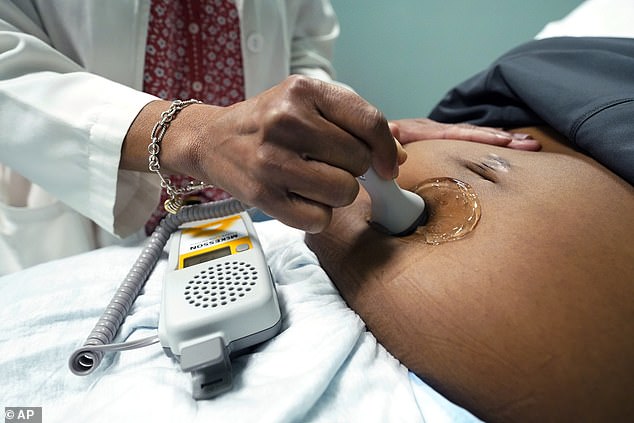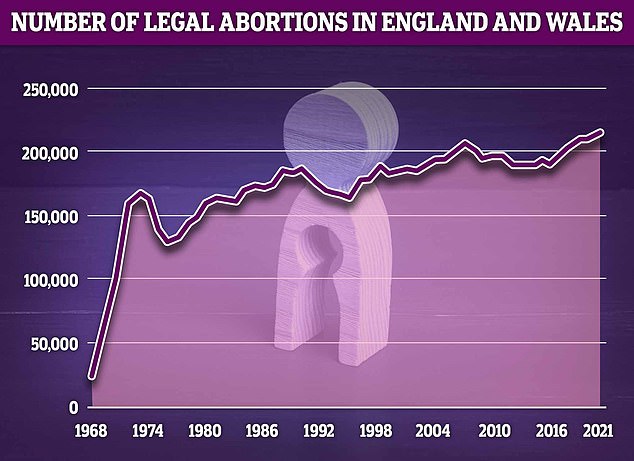Rising demand for abortions is forcing some women to wait more than three weeks for a termination, triple the recommended timeframe, a senior NHS official has warned.
Abortion demand in England and Wales has hit ‘unprecedented’ levels with NHS services ‘under huge pressure’ as a result, according to Steve Russell, Chief delivery officer for NHS England.
Issuing a warning in a letter to senior health executives, he said demand rose 17 percent in the first half of 2022, the latest data available.
He added that providers warned that women who need surgical abortions face wait times far beyond accepted standards.
Guidelines state that patients seeking abortion must be assessed within one week of their request and any subsequent procedures must be completed within one week of that assessment.
But Mr Russel said some providers reported being unable to meet this due to increasing demand, with some women experiencing delays of three weeks or longer.

One in four conceptions resulted in abortion in 2021 and more than 200,000 abortions were carried out, according to ONS data
“As a result of significant service pressures, providers tell us that wait times for surgical abortions (approximately 13% of procedures) do not meet these standards—often 3 weeks or longer,” his letter reads.
Surgical abortions are performed if the mother is between 10 and 24 weeks pregnant, compared to the ‘abortion pill’ or medical abortion, which is offered to women under 10 weeks pregnant.
There are many reasons why women have surgical abortions, from saying that a baby would harm their health or that they cannot afford it, to medical conditions that mean a the mother’s life would be endangered if the pregnancy were to continue.
Patients seeking an abortion should receive an assessment within a week of the request and it should also be completed within a week, according to NICE guidelines.
Russel also highlighted “significant continuity risks” to keeping abortion services open with evidence that some contractors, particularly those performing surgical procedures, were not receiving adequate funding.
“The nature of the abortion sector means there are national and regional risks if the fragility we see in service delivery is not addressed,” the letter reads.
He also expressed his concern for “vulnerable patients” who might need these services and be affected by delays.
He said: ‘A small but important number of service users will have experienced crime, including rape, domestic abuse, coercion, modern slavery or sexual exploitation. In addition, those living in areas of greatest deprivation are twice as likely to use these services.’
More than 200,000 abortions were carried out in 2021 and the Office of National Statistics reports that more than a quarter of conceptions resulted in abortion that year, a record high rate for England and Wales.
Charities have blamed the cost of living crisis for contributing to this ‘unprecedented’ level of demand for abortions.
There were 123,219 abortions between January and June 2022, compared with 105,488 in the same period in 2021, figures show.
Almost 215,000 abortions were carried out in England and Wales in 2021, according to government data, an increase of 2 per cent on the previous year.
More than half were performed at home via the pills by mail service, which was set up at the start of the pandemic to allow women to access medical abortions, according to the report by the Office for Health Improvement and Disparities.
The British Pregnancy Advisory Service (BPAS) previously warned that the cost of living crisis and ‘financial pressures’ on households were partly to blame for the rise, and that it could not see the increase slowing down.
BPAS chief executive Clare Murphy said: ‘The financial pressures on households will have forced women and their partners to make sometimes difficult decisions about continuing or terminating a pregnancy.’
She said that unplanned pregnancies are ‘not always unwanted’ and that many women who use BPAS services say that ‘the circumstances they are in mean that it is simply not the right time to start or extend a family’.
Mrs Murphy has called for better access to emergency contraception and wants it to be available on supermarket and pharmacy shelves rather than over the counter where women have to undergo ‘clinically unnecessary’ consultations.
She added: ‘However, no contraceptive method will ever negate the need for fast, accessible abortion care and BPAS is committed to providing kind, compassionate care to any woman who needs us, whenever that may be.’


The British Pregnancy Advisory Service (BPAS), which provides abortion care, said abortions rose by 17 per cent between 2021 and 2022


Data from the Office for Health Improvement and Disparities shows that 214,869 women had abortions in England and Wales in 2021, a 2 per cent increase on the more than 210,000 recorded in 2020
British women who are more than nine weeks and six days pregnant can go for a surgical abortion on the NHS.
The general limit for these abortions in the UK is 24 weeks of pregnancy, but they can be carried out after in very limited circumstances.
These include if the mother’s life would be put at risk by continuing the pregnancy, or if a test has revealed that the baby has a serious disability.
Surgical abortions are a fraction of the total number of abortions carried out in the UK, accounting for just 13 per cent of terminations in 2021.
The number of abortions performed on over 35s has been increasing over the past decade. In 2011, 27,199 had a termination against 40,789 in 2021.
